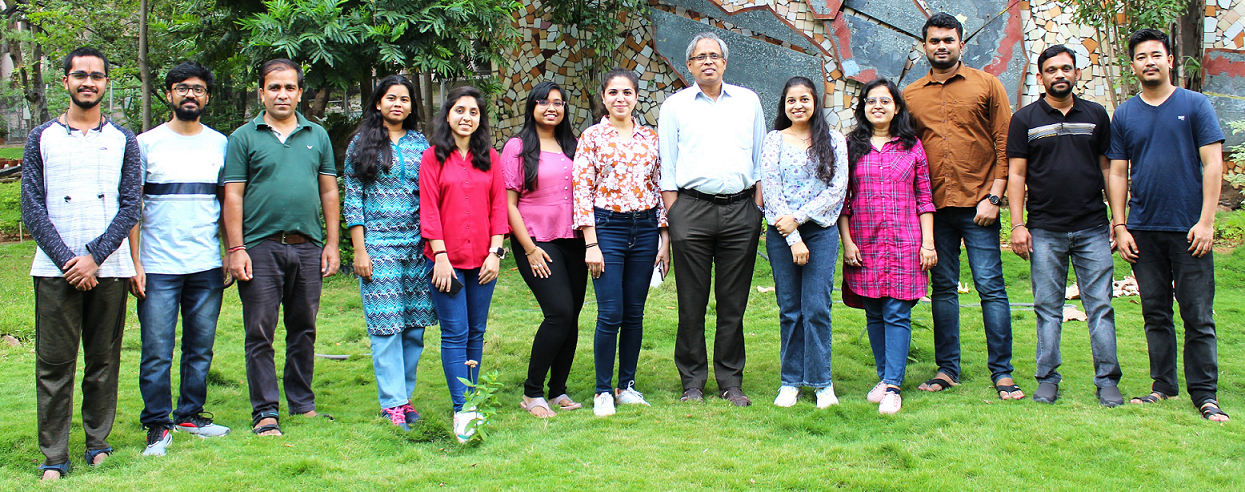CSIR - Centre for Cellular & Molecular Biology
Council of Scientific and Industrial Research
The Innovation Engine of India

Research Interests
Tuberculosis has been a long-standing problem in our country. Its complex physiology and ability to survive in hostile environments, coupled with the serious rise in multidrug-resistant (MDR) and extensively drug-resistant (XDR) tuberculosis cases, has necessitated the renewal of efforts to understand the molecular basis of its pathogenesis. To effectively treat tuberculosis, it is imperative to find newer targets, which are important for in-vivo bacterial survival and persistence. We work broadly on the following three areas.
Phosphorylation based signaling cascades modulated by Eukaryotic like Serine/Threonine Protein Kinases and phosphatase in Mtb, transduce extracellular stimuli to a cellular response ensuing pathogen\\\’s growth, persistence, and pathogenesis. We are interested in discovering signaling networks in Mtb and delineate how the STPKs regulate multiple cellular processes such as; cell division, cell wall synthesis, secretion, transcription, and survival in the host.
To effectively respond to the dynamic microenvironment of the hostile host, Mtb extensively remodels its transcriptional networks, and thus gene expression is fine-tuned in response to local environmental cues and growth conditions. We are interested in delineating the function of both non-essential and essential transcription factors in Mtb
A possible way to overcome the emergence of drug resistance is to combine antibiotic treatment that kills the bacteria with targeting host molecules that are necessary for the sustenance of infection, which is termed adjunct host-directed therapy (HDT). We investigate the important host pathways that can be used for HDT.
Selected Publications
Khan, M., Singha, B., Ali, F., Taunk, K., Rapole, S., Gourinath, S., & Nandicoori, V.K. (2021) Redox homeostasis in Mycobacterium tuberculosis is modulated by a novel actinomycetes-specific transcription factor. EMBO J , e106111.
Naz, S., Dabral, S., Nagarajan, S., Arora, D., Singh, L.V., Kumar, P., Singh, D., Kumar, D., Varshney, U. & Nandicoori, V.K. (2021) Compromised base excision repair pathway in Mycobacterium tuberculosis imparts superior adaptability in the host. Plos Pathogens 17 :e1009452. doi: 10.1371/journal.ppat.1009452.
Bhaskar, A., Kumar, S., Khan, M.Z., Singh, A., Dwivedi, V.P. & Nandicoori, V.K. (2020) Host Sirtuin 2 as an Immunotherapeutic Target against Tuberculosis. eLife Jul 22;9:e55415. doi: 10.7554/eLife.55415
Lochab, S., Singh, Y., Sengupta, S. & Nandicoori, V. K. (2020) Mycobacterium tuberculosis exploits host ATM kinase for survival advantage through SecA2 secretome. eLife Mar 30;9. pii: e51466. doi: 10.7554/eLife.51466.
Kaur, P., Rausch, M., Malakar, B., Watson, U., Damle, N. P., Chawla, Y., Srinivasan, S., Sharma, K., Schneider, T., Jhingan, G. D., Saini, D., Mohanty, D., Grein, F & Nandicoori, V. K. (2019) LipidII Interaction with specific residues of Mycobacterium tuberculosis PknB extracytoplasmic domain governs its optimal activation. Nature Communications 10, 1231 doi: 10.1038/s41467-019-09223-9.
Biotechnology ; Indian Institute of Technology, Bombay ; 1989-91
MCBL, Indian Institute of Sciences, Bangalore ; 1991-97 ;
Texas A & M University, College Station, Texas, USA. ; Oct 1997-Oct 2000
University of Virginia, Charlottesville, Virginia, USA. ; Dec 2000-July 2004
Scientist: National Institute of Immunology, New Delhi, July 2004-May 2021


Sr. Technical Officer(1)

Research Associate-I

Research Associate

Senior Research Fellow

Junior Research Fellow

Junior Research Fellow

Senior Research Assistant

Project Associate-II

Project Associate
 Advertisement no 07/10 for the post Junior Scientist.
Advertisement no 07/10 for the post Junior Scientist.
 List of shortlisted candidates for the temporary positions against CCMB Web Notif.No.0724/B- [26-08-2024]
List of shortlisted candidates for the temporary positions against CCMB Web Notif.No.0724/B- [26-08-2024]
 Result of selected candidates for the temporary positions against CCMB Web Notif.No.0724/A - [21-08-2024]
Result of selected candidates for the temporary positions against CCMB Web Notif.No.0724/A - [21-08-2024]
 Notification of Schedule for Trade Test and Downloading of Admit Cards for the posts of Gr. II (1)/Technician (1) against Advt.No:01/2021 - [19-08-2024]
Notification of Schedule for Trade Test and Downloading of Admit Cards for the posts of Gr. II (1)/Technician (1) against Advt.No:01/2021 - [19-08-2024]
 List of selected candidates for the temporary positions against CCMB Web Notif.No.0624/A - [14-08-2024]
List of selected candidates for the temporary positions against CCMB Web Notif.No.0624/A - [14-08-2024]
 List of shortlisted candidates for the temporary positions against CCMB Web Notif.No.0724/A - [02-08-2024]
List of shortlisted candidates for the temporary positions against CCMB Web Notif.No.0724/A - [02-08-2024]
 Notification No.0824/A for various temporary positions on contractual basis- [02-08-2024]
Notification No.0824/A for various temporary positions on contractual basis- [02-08-2024]
 Notification No.0724/B for various temporary positions on contractual basis - [29-07-2024]
Notification No.0724/B for various temporary positions on contractual basis - [29-07-2024]
 List of shortlisted candidates for the temporary positions against CCMB Web Notif.No.0624/A- [19-07-2024]
List of shortlisted candidates for the temporary positions against CCMB Web Notif.No.0624/A- [19-07-2024]
 List of Provisionally empanelled candidates for Engagement as Project staff Vide Notif.No.2024/1 - [15-07-2024]
List of Provisionally empanelled candidates for Engagement as Project staff Vide Notif.No.2024/1 - [15-07-2024]